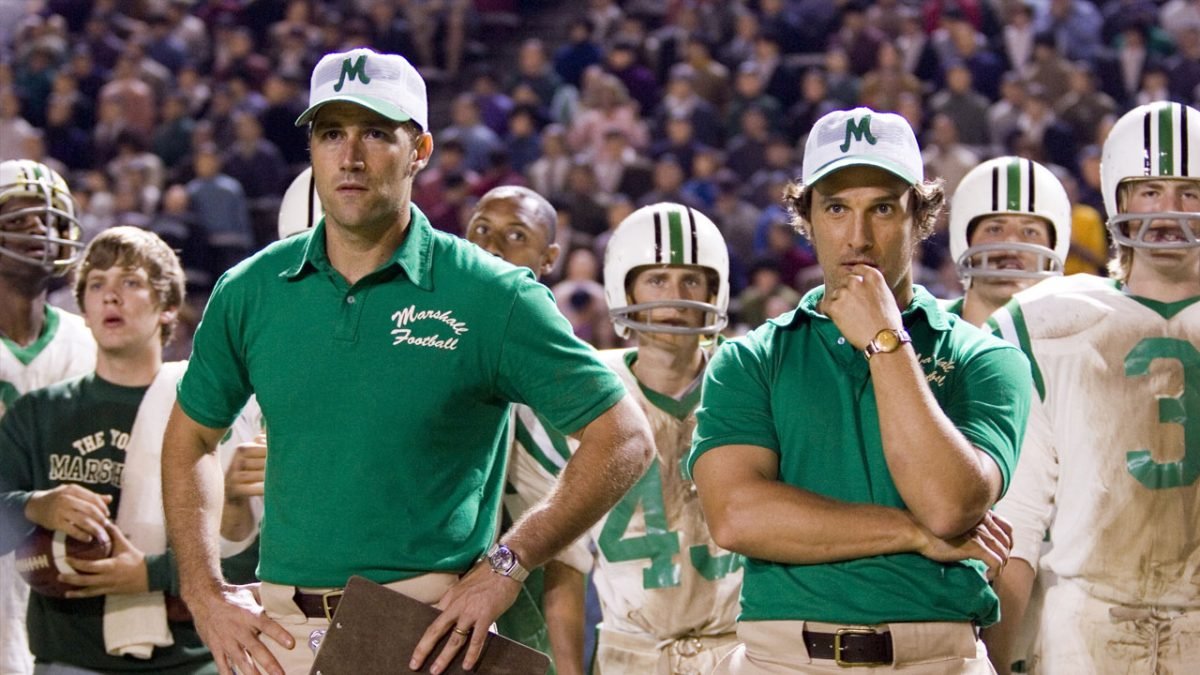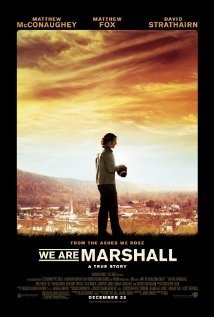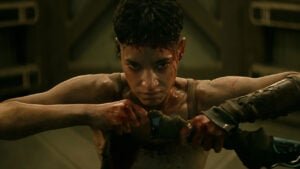It’s been a football-heavy couple of months at the box office, so what does it matter if one more’s being thrown into the mix? Well, no harm perhaps, but the risk of saturation is real and assuredly achieved with the thanks of We Are Marshall; another based-on-a-true-story fable about how football changes lives and inspires the lowliest among us to greatness. Of the three major football movies lately including Invincible and Gridiron Gang, We Are Marshall is, by far, the weakest of the trinity; clichéd and uninspired, it really offers nothing new to say about the game or those who play it.
In 1970, a plane carrying the varsity football team, athletic director, coaching staff and fans of Marshall University crashed on the outskirts of Huntington West Virginia, killing all on board; it was, and remains, one of the worst disasters in college sports history. The crash has a profound effect on the small, college town of Huntington and in consideration of the terrible loss, Marshall President Donald Dedmon (David Strathairn) considers cancelling the football program. This development doesn’t sit right with the four surviving members of the team, who persuade the Board of Directors to keep the team going and start to rebuild—beginning with the hiring of a head coach.
Enter Jack Lengyel (Matthew McConaughey), a young coach with some folksy notions and a down-home charm. Being the only candidate to show interest, he’s hired and begins about setting himself the task of rebuilding the football team and school spirit. Lengyel recruits back Red Dawson (Matthew Fox), the only surviving member of the coaching staff, and then with President Dedmon’s help, they convince the NCAA to let them play freshmen on their Varsity team.
In the interest of true confession, I’m about to tear into a movie that has its heart in the right place and I do feel bad. But then I remember something from the movie or I uncover a bit of trivia that makes me say, “Oh yeah, that’s why this thing’s getting a big thumbs down.” In this case, college sport historians will note that the ubiquitous chant “We Are…Marshall”, that is repeated ad nauseam throughout the movie wasn’t even in use at Marshall in 1970. Of course, I’ve long expected that little things like historical accuracy have mattered little to director *sigh*…McG. (I use the “*sigh*” as a parenthesis to the fact that any serious director would use his real name, in this case Joseph McGinty Nichol. As to what *sigh*…McG, thinks is wrong with Joe Nichol, I’ll never know; but I’ll reclaim it in his honour starting now in order to show him that it’s not so bad. He may thank me one day.)
Nichol, as you may recall, is the director of several notable music videos and the two Charlie’s Angels movies, which were notable for different reasons. Budgets aside, my junior high school friend Eric was more accomplished as a filmmaker by the time he was 13 than Nichol is now. But I digress because the film industry is a tough nut to crack and Nichol obviously deserves Mr Burns-style kudos for making it this far. Here’s the thing: football as an original movie concept was done with Rudy. Once the hobbit becomes a gridiron hero, it’s over; even the Gipper’s gotten sick of the game and now he’s doing jigsaw puzzles in boredom. You have to bring something new, be it an angle, a style or simply the delivery and commitment of the actors.
Invincible embraced the formula while showing the game in close contact; Gridiron Gang created a strong sense of empathy for characters to which football was a literal escape. Unfortunately, We Are Marshall never gets me there; I just don’t feel it. I appreciate that this was a huge deal that permanently affected a great number of people and the town they lived in and I appreciate, as the movie depicts, that there was a lot of hard work put in by Lengyel, Dawson and Dedmon in rebuilding Marshall’s football program. The problem is that the director assigns the kind of weight in loss and purpose as if he’s talking about rebuilding New Orleans after Katrina.
There’s nothing terribly original about Marshall. All the right notes are hit; all the left turns are telegraphed far in advanced, almost as if out of a playbook. The character drama is same-old, whether its Dawson’s survivor’s guilt or a football player’s grieving girlfriend or the even more guilt-ridden father played by Ian McShane whose heartache makes him the driving voice against the continuation of football at Marshall. It wouldn’t be a spoiler to say that everyone finds their way in the end; the real twist would be if they didn’t. Even the football scenes are stale, just completely uninteresting and unexciting. The camera is static, never really getting into the game and almost as if the action was being recorded for broadcast like it’s an actual game being covered rather than an essential part of the story.
So yes, I feel bad for dumping on Marshall, but that doesn’t change a thing I feel about the movie. Better luck next outing Joe, because you’re due for some and I’m serious about that name change.





